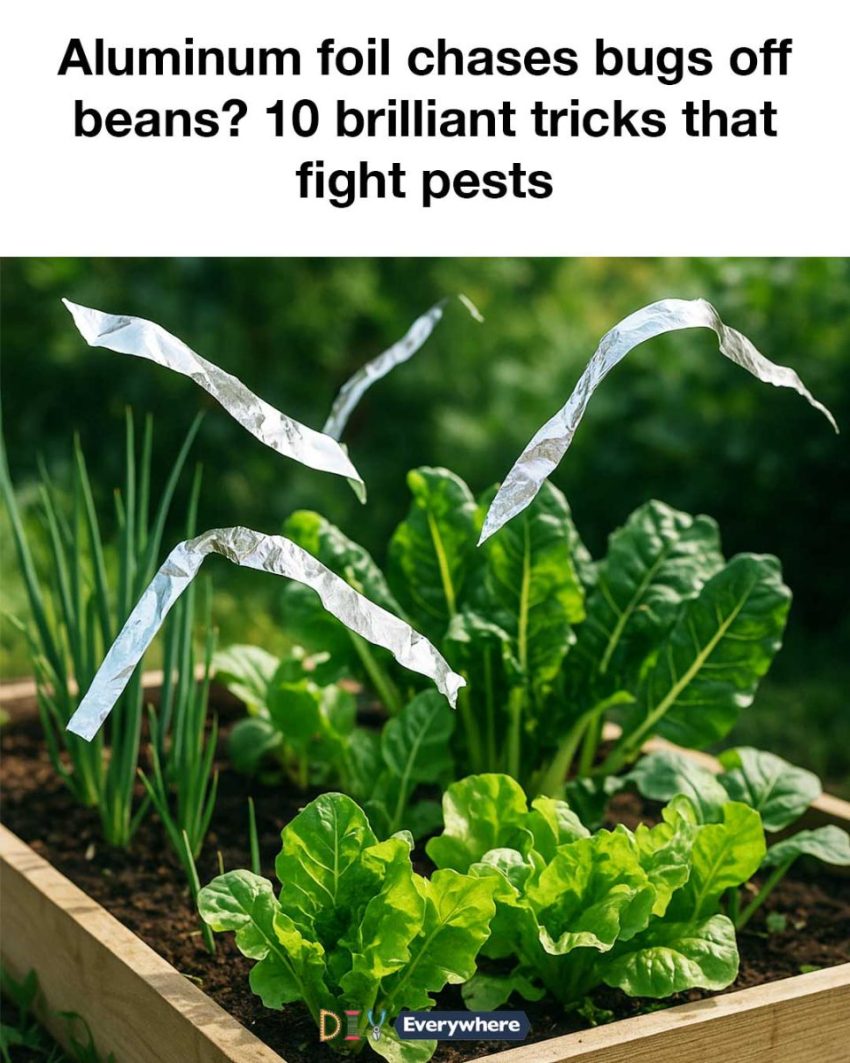ADVERTISEMENT
1. Aluminum Foil as a Bean Protector
Aluminum foil is not just for wrapping leftovers; it can also be a powerful tool in your garden. By placing strips of aluminum foil around the base of bean plants, you can create a reflective surface that confuses and deters insects. The shiny surface reflects light, which disorients pests like aphids and beetles, making it difficult for them to land on the plants.
To use this method, cut aluminum foil into strips about 2 inches wide and lay them around the base of your bean plants. You can also mix small pieces of foil into the mulch to enhance the reflective effect. This simple trick not only protects your beans but also helps retain soil moisture and regulate temperature.
2. Coffee Grounds to Deter Slugs
Coffee grounds are a fantastic natural deterrent for slugs and snails. The texture of the grounds is abrasive to these soft-bodied pests, and the caffeine content is toxic to them. To use coffee grounds in your garden, simply sprinkle them around the base of plants that are prone to slug damage.
For best results, use fresh coffee grounds and apply them in a thick layer, about half an inch deep, to create a barrier. Not only will this help keep slugs away, but it will also add organic matter to your soil, improving its quality over time.
3. Vinegar Spray for Ant Control
Vinegar is a versatile household item that can be used to control ants in your garden. The strong smell of vinegar disrupts the scent trails that ants use to navigate, effectively deterring them from entering your garden.
To make a vinegar spray, mix equal parts of water and white vinegar in a spray bottle. Spray the solution directly onto ant trails and around the perimeter of your garden. Be sure to reapply after rain or watering, as the vinegar will wash away.
4. Neem Oil for Aphid Management
Neem oil is a natural pesticide derived from the seeds of the neem tree. It is highly effective against aphids and other soft-bodied insects. Neem oil works by disrupting the feeding and reproductive cycles of pests, ultimately reducing their population.
To use neem oil, mix 2 tablespoons of neem oil with 1 gallon of water and a few drops of dish soap to help the solution adhere to the plants. Spray the mixture onto affected plants, ensuring to cover both the tops and undersides of leaves. Apply every 7-14 days for best results.
5. Garlic Spray to Repel Insects
Garlic has natural insect-repelling properties, making it an excellent choice for an organic pest control spray. The strong odor of garlic confuses and deters many common garden pests, including aphids, beetles, and caterpillars.
To make a garlic spray, blend two bulbs of garlic with 1 quart of water, then strain the mixture through a cheesecloth. Add the strained liquid to a spray bottle and apply it to your plants. Reapply every few days or after rain to maintain its effectiveness.
6. Diatomaceous Earth for Crawling Bugs
Diatomaceous earth is a natural powder made from the fossilized remains of tiny aquatic organisms. It is highly effective against crawling insects like ants, beetles, and slugs. The sharp edges of the powder cut through the exoskeletons of insects, causing them to dehydrate and die.
To use diatomaceous earth, dust it lightly around the base of plants and on the leaves where pests are present. Be sure to wear a mask when applying, as the fine particles can irritate the lungs. Reapply after rain or watering, as moisture reduces its effectiveness.
7. Essential Oils as Natural Repellents
Essential oils such as peppermint, eucalyptus, and lavender can be used to repel a variety of garden pests. These oils have strong scents that deter insects like mosquitoes, flies, and beetles.
To create an essential oil spray, mix 10-15 drops of your chosen essential oil with 1 cup of water and a few drops of dish soap. Spray this mixture onto your plants, focusing on areas where pests are most active. Reapply every few days or after rain for continued protection.
8. Banana Peels to Ward Off Aphids
Banana peels are a surprising yet effective way to deter aphids from your garden. The peels release compounds that are toxic to aphids, keeping them away from your plants.
To use banana peels, simply chop them into small pieces and bury them about an inch deep in the soil around the base of your plants. As the peels decompose, they will release nutrients into the soil, benefiting your plants while keeping aphids at bay.
9. Soap and Water Solution for Soft-Bodied Insects
A simple soap and water solution can be an effective way to control soft-bodied insects like aphids, spider mites, and whiteflies. The soap disrupts the cell membranes of the insects, causing them to dehydrate and die.
To make a soap solution, mix 1 tablespoon of liquid dish soap with 1 quart of water. Spray the solution directly onto the affected plants, ensuring to cover all surfaces. Reapply every few days until the pest problem is under control.
10. Companion Planting for Natural Pest Control
Companion planting involves growing certain plants together to naturally repel pests and improve plant health. For example, planting marigolds alongside tomatoes can deter nematodes, while basil planted near peppers can ward off aphids and spider mites.
Research the best companion plants for your garden and strategically place them to maximize their pest-repelling benefits. Not only will this method help control pests, but it can also enhance the growth and flavor of your crops.
11. Beer Traps for Snails and Slugs
Beer traps are a classic method for controlling snails and slugs in the garden. The yeast in beer attracts these pests, and once they enter the trap, they drown.
To create a beer trap, bury a shallow container, such as a yogurt cup, so that the rim is level with the soil. Fill the container with beer and leave it overnight. In the morning, you’ll find that the snails and slugs have been lured in and eliminated. Replace the beer every few days to maintain its effectiveness.


